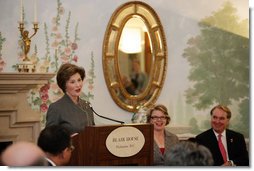
Read
the transcript of the First Lady's remarks.
"Literacy is the foundation of personal freedom. Being able to read, and choosing what we read, is how we shape our beliefs, our minds, and our characters. Reading brings self-reliance and independence. For many women and their children, literacy can even mean the difference between life and death. A mother who can read can understand the label on a food container. She knows how to follow the instructions on a bottle of medicine. She's more likely to make wise decisions about her life that will keep her and her children healthy.
"Literacy is the foundation of economic freedom. Free markets require informed consumers, and that means consumers who can read. Wider literacy also increases economic participation, which leads to more stable and vibrant economies......
"Today, I'm delighted to announce that this September, during the opening of the 61st session of the U.N. General Assembly, we'll convene a Conference on Global Literacy in New York. Working in cooperation with the U.S. Department of Education, the U.S. State Department, the U.S. Agency for International Development, and UNESCO, the United Nations Scientific and Cultural Organization, we'll be looking at literacy programs that work, and connecting countries with the information they need to implement similar programs. The Conference will also encourage leaders from around the world to become involved in literacy in their own countries, and then to learn ways to support UNESCO's goal of Education for All by 2015."


